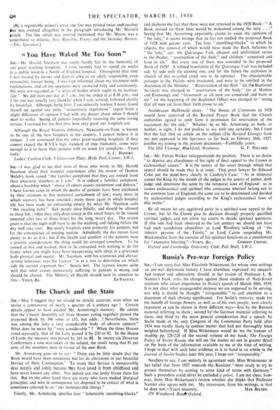The Church and the State
Stn.—May I suggest that we should be strictly accurate, even when we revive a controversy of nearly a quarter of a century ago ? Certain details appear to have escaped Mr. Armstrong's memory. He admits that the Church Assembly (all three Houses voting together) passed the proposed Book by 396 votes to 153, but adds: .:Nevertheless, there was among the laity a very considerable body of adverse opinion." What does he mean by " very considerable" ? When the three Houses voted separately, that of the Laity passed it by 230 to 92. In the House of Lords the measure was passed by 2.41 to 88. In twenty-six Diocesan Conferences a vote was taken on the subject, the result being that 81 per cent. of the members were in favour of the new Book.
Mr. Armstrong goes on to say: "There can be little doubt that the Book would have been sanctioned but for its alterations in our beautiful Service of Holy Communion." many that Service is inexpressibly dear simply and solely because they have loved it from childhood and have never known any other. Nor indeed can one justly blame them for this. But on the other hand there are many who have studied liturgical principles, and who in consequence are disposed to be critical of what is sometimes referred to as " our incomparable liturgy."
Finally. Mr. Armstrong specifies.four " lamentable stumbling-blocks,"
and deplores the fact That these were not removed in the 1928 Book: " A Book revised on these lines would be welcomed among the laity . . ." Seeing that Mr. Armstrong apparently claims to voice the opinions of " the laity," it seems strange that he has not studied the proposed Book of 1928 with greater care. The four " stumbling-blocks" to which he objects, the removal of which would have made the Book welcome to " the laity," are: the Quicunque Vult, obscure and unchristian verses in the Psalter, " resurrection of the flesh," and children " conceived and born in sin." But every one of these was amended in the proposed Book of 1928! A revised translation of the Quicunque Vult was included side by side with the existing one, and for the future the recitation in church of this so-called creed was to be optional. The objectionable passages in the Psalms were bracketed, and were to be omitted at the discretion of the Minister. " Resurrection of the flesh " (in the Baptismal Services) was changed to "resurrection of the body" (as at Mattins and Evensong), and " forasmuch as all men are conceived and born in sin " (at the beginning of the Baptismal Office) was changed to " seeing that all men are from their birth prone to sin."
Archdeacon McDonald states: " The House of Commons in 1928 would have approved of the Revised Prayer Book had the Church authorities agreed to omit from it permission for reservation of the sacrament for the sick." Whether he or Mr. Armstrong, or both, or neither, is right, I do not profess to say with any certainty, but I trust that the fact that an article on the subject (The Revised Liturgy) from my pen appeared in the Spectator as far back as Februry 26th, 1927, justifies my joining in the present discussion.—Faithfully yours, The Old Vicarage, Blackford, Wedmore. G. F. POLLARD.






































 Previous page
Previous page